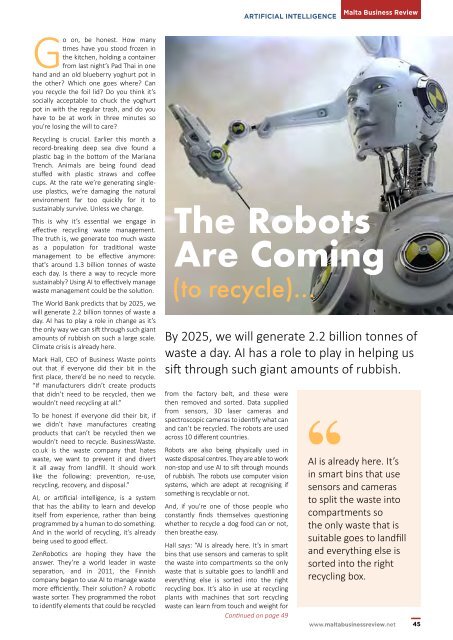Create successful ePaper yourself
Turn your PDF publications into a flip-book with our unique Google optimized e-Paper software.
ARTIFICIAL INTELLIGENCE<br />
Malta Business Review<br />
Go on, be honest. How many<br />
times have you stood frozen in<br />
the kitchen, holding a container<br />
from last night’s Pad Thai in one<br />
hand and an old blueberry yoghurt pot in<br />
the other? Which one goes where? Can<br />
you recycle the foil lid? Do you think it’s<br />
socially acceptable to chuck the yoghurt<br />
pot in with the regular trash, and do you<br />
have to be at work in three minutes so<br />
you’re losing the will to care?<br />
Recycling is crucial. Earlier this month a<br />
record-breaking deep sea dive found a<br />
plastic bag in the bottom of the Mariana<br />
Trench. Animals are being found dead<br />
stuffed with plastic straws and coffee<br />
cups. At the rate we’re generating singleuse<br />
plastics, we’re damaging the natural<br />
environment far too quickly for it to<br />
sustainably survive. Unless we change.<br />
This is why it’s essential we engage in<br />
effective recycling waste management.<br />
The truth is, we generate too much waste<br />
as a population for traditional waste<br />
management to be effective anymore:<br />
that's around 1.3 billion tonnes of waste<br />
each day. Is there a way to recycle more<br />
sustainably? Using AI to effectively manage<br />
waste management could be the solution.<br />
The World Bank predicts that by 2025, we<br />
will generate 2.2 billion tonnes of waste a<br />
day. AI has to play a role in change as it’s<br />
the only way we can sift through such giant<br />
amounts of rubbish on such a large scale.<br />
Climate crisis is already here.<br />
Mark Hall, CEO of Business Waste points<br />
out that if everyone did their bit in the<br />
first place, there’d be no need to recycle.<br />
“If manufacturers didn’t create products<br />
that didn’t need to be recycled, then we<br />
wouldn’t need recycling at all.”<br />
To be honest if everyone did their bit, if<br />
we didn’t have manufactu<strong>res</strong> creating<br />
products that can’t be recycled then we<br />
wouldn’t need to recycle. BusinessWaste.<br />
co.uk is the waste company that hates<br />
waste, we want to prevent it and divert<br />
it all away from landfill. It should work<br />
like the fol<strong>low</strong>ing: prevention, re-use,<br />
recycling, recovery, and disposal.”<br />
AI, or artificial intelligence, is a system<br />
that has the ability to learn and develop<br />
itself from experience, rather than being<br />
programmed by a human to do something.<br />
And in the world of recycling, it’s already<br />
being used to good effect.<br />
ZenRobotics are hoping they have the<br />
answer. They’re a world leader in waste<br />
separation, and in 2011, the Finnish<br />
company began to use AI to manage waste<br />
more efficiently. Their solution? A robotic<br />
waste sorter. They programmed the robot<br />
to identify elements that could be recycled<br />
The Robots<br />
Are Coming<br />
(to recycle)...<br />
By 2025, we will generate 2.2 billion tonnes of<br />
waste a day. AI has a role to play in helping us<br />
sift through such giant amounts of rubbish.<br />
from the factory belt, and these were<br />
then removed and sorted. Data supplied<br />
from sensors, 3D laser cameras and<br />
spectroscopic cameras to identify what can<br />
and can’t be recycled. The robots are used<br />
across 10 different countries.<br />
Robots are also being physically used in<br />
waste disposal cent<strong>res</strong>. They are able to work<br />
non-stop and use AI to sift through mounds<br />
of rubbish. The robots use computer vision<br />
systems, which are adept at recognising if<br />
something is recyclable or not.<br />
And, if you’re one of those people who<br />
constantly finds themselves questioning<br />
whether to recycle a dog food can or not,<br />
then breathe easy.<br />
Hall says: “AI is already here. It’s in smart<br />
bins that use sensors and cameras to split<br />
the waste into compartments so the only<br />
waste that is suitable goes to landfill and<br />
everything else is sorted into the right<br />
recycling box. It’s also in use at recycling<br />
plants with machines that sort recycling<br />
waste can learn from touch and weight for<br />
Continued on page 49<br />
AI is already here. It’s<br />
in smart bins that use<br />
sensors and cameras<br />
to split the waste into<br />
compartments so<br />
the only waste that is<br />
suitable goes to landfill<br />
and everything else is<br />
sorted into the right<br />
recycling box.<br />
www.maltabusinessreview.net<br />
45
















